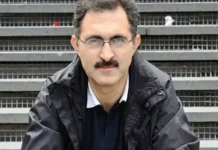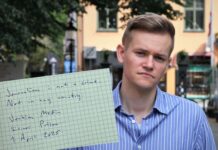Leaked documents accessed by Dagens ETC journalists have revealed that Sweden secretly altered its immigration procedures to deny or delay asylum or residency to Turkish dissidents associated with the faith-based Gülen movement in order to preserve its diplomatic relations with Turkey, the Dagens ETC news website reported.

The documents indicate that Sweden’s Migration Agency has been secretly sending asylum cases involving movement members to the Ministry of Foreign Affairs and the Swedish Security Service (Säpo). The reasoning behind that is that dissidents and non-loyalist citizens from Turkey might harm Sweden’s new relationship with Turkish President Recep Tayyip Erdoğan’s regime. This policy change came as part of Sweden’s efforts to secure NATO membership.
During the NATO accession process, which required the unanimous approval of all existing member states, Turkey pressured Sweden into banning diaspora organizations critical of Erdogan and extraditing Turkish citizens living in exile.
Ankara labeled these political exiles as “terrorists” who had found refuge in Sweden, linking them to the outlawed Kurdistan Workers’ Party (PKK) or the Gülen movement.
This pressure forced Sweden to sign two agreements with Turkey in Madrid and Vilnius in 2022 and 2023, respectively, in which the Nordic country agreed to present a “roadmap” for implementing counterterrorism measures. In return, Turkey promised to send the Swedish accession protocol to the Turkish parliament for ratification. Sweden became a NATO member in March after some two years of attempting to convince Turkey and Hungary to ratify the accession.
The agreements outlined long-term cooperation against terrorism between the police and intelligence services of both countries, even after the NATO membership ratification.
While only the PKK is designated as a terrorist organization by parts of the international community including the EU and the US, both the PKK and the Gülen movement are mentioned in the agreements’ paragraphs on terrorism.
Erdoğan has been targeting followers of the Gülen movement, inspired by Muslim cleric Fethullah Gülen, since corruption investigations in 2013 that implicated then-prime minister Erdoğan, his family members and his inner circle.
Dismissing the investigations as a Gülenist coup and conspiracy against his government, Erdoğan designated the movement as a terrorist organization and began to target its members. He intensified the crackdown on the movement following a failed coup attempt in 2016 that he accused Gülen of masterminding. Gülen and the movement strongly deny involvement in the coup attempt or any terrorist activity.
Following the failed coup, the Turkish government declared a state of emergency and carried out a massive purge of state institutions under the pretext of an anti-coup fight. More than 130,000 public servants, including 4,156 judges and prosecutors, as well as 29,444 members of the armed forces were summarily removed from their jobs for alleged membership in or relationships with “terrorist organizations” by emergency decree-laws subject to neither judicial nor parliamentary scrutiny.
In addition to the thousands who were jailed, scores of other Gülen movement followers had to flee Turkey to avoid the government crackdown, with most asylum seekers arriving in Europe through neighboring Greece.
Official EU asylum statistics indicate a significant surge of Turkish applicants in the aftermath of the failed coup, with Turks ranking among the largest groups along with Syrians and Afghans.
One such individual is Mehmet Aydoğmuş, a 35-year-old former journalist living in exile who fled Turkey in 2016. Aydoğmuş previously worked as the news editor at a newspaper in Turkey that was critical of the Erdogan regime. In connection with the coup attempt, he happened to have a reporter out on assignment who saw the movements of the soldiers involved in the coup attempt and immediately reported the breaking news.
“The government used that to claim that we knew about the coup attempt in advance. They banned our newspaper, and my name was on the first list the government published of journalists who were being sought.”
Aydoğmuş has been standing trial in absentia since 2018 and faces four charges, risking being sentenced to 15 years in prison, including for alleged membership in the Gülen movement.
Aydoğmuş, who was granted refugee status and was living in Sweden on a temporary residence permit, applied for permanent residency in 2022 but faced repeated delays.
“I emailed my caseworkers at least a hundred times. They always responded the same way, saying they had a very heavy workload,” he said.
After many rounds, he appealed his case to the Migration Court in early 2024, and in the spring, he requested the Migration Agency’s documents about him.
He found notes showing that the Migration Agency had a briefing about his case with Säpo in June 2023. He also obtained a classified letter sent to the Ministry of Foreign Affairs dated November 9, 2023. In the title, it refers to paragraph 10.13 of the Swedish Constitution, stating that authorities are obliged to notify the government about issues significant for relations with another state.

In the letter the Migration Agency’s legal counsel, Carl Bexelius, wrote that Aydoğmuş sympathizes with the Gülen movement and that they are considering granting him a residence permit. But Bexelius informed the Ministry of Foreign Affairs because “the circumstances of the case may be a matter of significance for Sweden’s relations with Turkey.”
The letter to the ministry also states that Turkey has prepared a request to have him extradited and that President Erdoğan himself is the plaintiff in the legal case against Aydoğmuş.
His case was reviewed by Säpo and stalled at the Ministry of Foreign Affairs for several months before he was finally granted a permanent residence permit in May 2024.
Aydoğmuş expressed his disillusionment with Sweden’s justice system, stating, “I moved to Sweden with the idea that I had finally found a country where I could live in freedom. But I can no longer trust the justice system. The Migration Agency has acted as if they are part of the government’s political agenda.
“I know how much NATO has influenced Sweden. I think the authorities decided to freeze all our cases to see where the politics were going. It has been the same for my Turkish journalist friends for the past two years; they haven’t received any answers either.”
Aydoğmuş also said he does not feel safe in Sweden, referring to the fact that in recent years, several Turkish journalists in exile, including Ahmet Dönmez and Abdullah Bozkurt, were attacked on the street. “But I can’t do anything about it, just try to stay vigilant,” he said.
Turkish opposition figures living in exile in Sweden, particularly those on a list of political dissidents whose extradition is demanded by the Turkish government, were previously targeted by a pro-government Turkish newspaper, which revealed their home addresses and published secretly taken photographs. In 2022, the Sabah daily published photos of Stockholm-based journalists Bülent Keneş, Abdullah Bozkurt and Levent Kenez. Erdoğan has mentioned Keneş by name and demanded his extradition from Sweden.
Sweden’s Supreme Court has, so far, rejected all of the extradition requests, arguing that the individuals have not committed any crime under Swedish law and that there is a risk of torture and persecution in Turkey.
Lawyer Michel Moré, who has been representing refugees connected to the Gülen movement since 2016, confirmed a noticeable change in the Migration Agency’s handling of these cases since the NATO agreements.
“The problems getting their cases approved are entirely new for this group. How it worked then and how it works today are like two different worlds,” Moré said.
“My clients have previously been granted residence permits without the Security Police requesting a referral. So why are these people being noticed this way now?”
For Moré, it is clear that the directives have not come from the agency but from the government.
“I don’t think they [the Migration Agency] came up with this themselves; it comes from the government. These cases have been frozen at the Ministry of Foreign Affairs and could not proceed to decisions. It appears that they have intentionally wanted to pause the cases. And it is equally clear that this is connected to the NATO process; nothing like this had happened before it started.”
According to Dagens ETC, the Migration Agency has recently started asking very specific questions to asylum seekers with connections to the Gülen movement about their networks within the movement and their engagement with it in exile. The applicants have been asked to talk about any connection with the movement in Sweden, especially with “high-profile people,” and have also been asked about engagement in Gülen-related associations. These questions could indicate systematic identification of such people, potentially influenced by Turkish intelligence.
Micael Sahlin, the former Swedish ambassador to Turkey and now a Turkey analyst at the Swedish Institute of International Affairs, expressed surprise at how the Gülen movement-linked cases have been handled by Swedish authorities and the Ministry of Foreign Affairs. “Labeling [the Gülen movement] as terrorists is crucial for the legitimacy of the Erdoğan regime, but from a Swedish perspective, we shouldn’t play along. We have no reason to be worried about the Gülen movement from a security standpoint, ” he said.
Sahlin further added, “It’s in the Madrid and Vilnius agreements that we now accept responsibility for security in other member states as well. But such considerations should hardly clash with our own values.”















